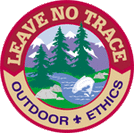|
Click above links to learn more...
|
Leave No Trace Principles
1. Plan Ahead and Prepare Proper trip planning and preparation helps hikers and campers accomplish trip goals safely and enjoyably while minimizing damage to natural and cultural resources. Campers who plan ahead can avoid unexpected situations, and minimize their impact by complying with area regulations such as observing limitations on group size. Schedule your trek to avoid times of high use. Obtain permits or permission to use the area for your trek. 2. Travel and Camp on Durable Surfaces Damage to land occurs when visitors trample vegetation or communities of organisms beyond recovery. The resulting barren areas develop into undesirable trails, campsites, and soil erosion. 3. Dispose of Waste Properly (Pack It In, Pack It Out) This simple yet effective saying motivates backcountry visitors to take their trash home with them. It makes sense to carry out of the backcountry the extra materials taken there by your group or others. Inspect your campsite for trash or spilled foods. Accept the challenge of packing out all trash, leftover food, and litter. 4. Leave What You Find Allow others a sense of discovery, and preserve the past. Leave rocks, plants, animals, archaeological artifacts, and other objects as you find them. Examine but do not touch cultural or historical structures and artifacts. It may be illegal to remove artifacts. 5. Minimize Campfire Impacts Some people would not think of camping without a campfire. Yet the naturalness of many areas has been degraded by overuse of fires and increasing demand for firewood. 6. Respect Wildlife Quick movements and loud noises are stressful to animals. Considerate campers practice these safety methods: 7. Be Considerate of Other Visitors Thoughtful campers respect other visitors and protect the quality of their experience. |
